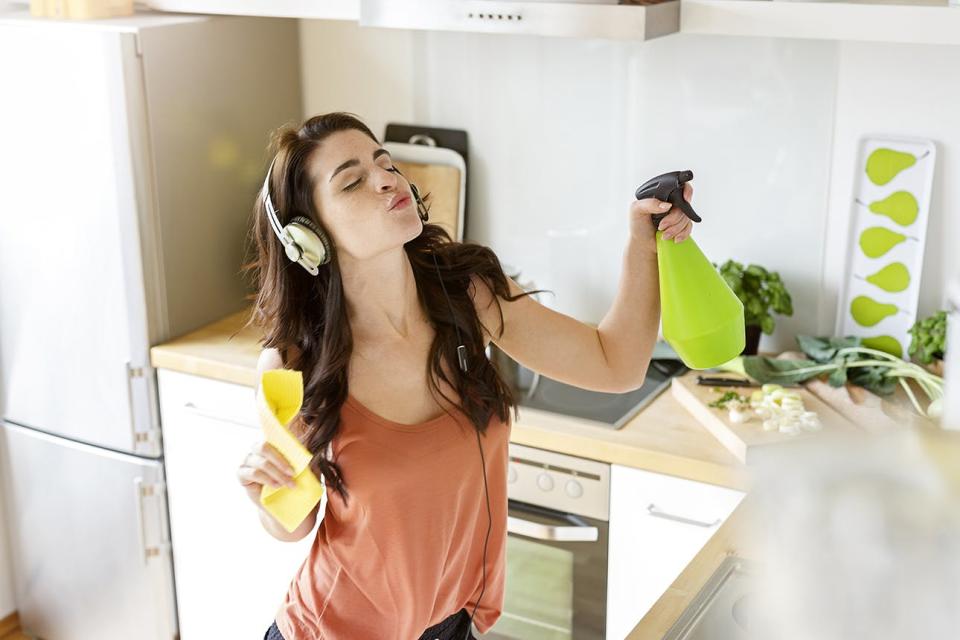How to Deal When Your Partner Is the “Messy One”
When you move in with your significant other, there’s bound to be an adjustment period in terms of housework and completing chores. You’re feeling each other out, trying to get a sense of how each of you prefers to live. You may even find yourselves testing each other’s boundaries, pushing your partner to their cleanliness and neatness limits. After all, everyone’s standards of comfortable living are different. While you demand floors you could serve dinner on and pristine countertops, your bae may be perfectly content with slightly dusty surfaces and a cluttered bedroom.

If that’s the dynamic in your relationship, you may have resigned yourself to the fact that, since you’re always going to be the one who cares more, you’re also always going to be the one actually does the cleaning. Chicago-based counselor Lauren Freier knows this tension all too well from her work with couples. More often than not, she tells us, discrepancies like this tend to be indicative of other issues below the surface.
“Let’s take the dishes, for example,” she says. “Why might that be important to you? Perhaps arriving home to a clean kitchen helps ease your stress after a long day of work, or maybe you’ve been feeling chaos and uncertainty in other areas of your life and your home is the one place you have control over, so you need that to be neat. It might feel like every time your partner leaves their plate sitting in the sink, they are valuing their time over yours, because now you’re the one that has to clean it.”
The key to establishing a more comfortable balance of housework in your shared home — even if you are the one who cares more about how your house or apartment looks — is, you guessed it, communication. As the neat freak in the relationship, you may want to spend some time thinking about what’s really behind your need for cleanliness and your frustration with your S.O. Are you craving control? Do you want your partner to share your values? Are you looking for acknowledgment for the work that you do? Reflect, then share your conclusions with your sweetie.
“Once couples gain deeper insight into their own and their partner’s inner worlds, they are often more open to meeting one another’s needs and requests because they’re able to see the meaning they carry,” Freier says. “Mutual understanding and respect is a really helpful place to start.”
Basically, your partner may be a lot more willing to step up their clean-up game if they realize that your need for order in the home is about your mental state and not just a desire to keep up with appearances. Identifying specific ways in which your significant other can help you feel supported and respected in your home will go a lot further than complaining about all of the things they’re not doing to maintain your space. And practicing these strategies will pay off in other areas of your relationship.
“Tension about household chores can absolutely creep into other aspects, particularly because this is often connected to someone not feeling heard, valued, or respected as an equal,” Freier tells us. “The opportunities are rampant for this to show up just about anywhere.”
Stop those tensions in their tracks with Freier’s specific tips:
1. Talk about expectations directly. Remember that you and your partner come from different backgrounds, which means that you’ve seen different models for the balance of household responsibilities. Open up to your partner about how your family of origin handled these matters and ask them to do the same. From there, you can talk about your individual expectations for your own home and relationship.
2. Be flexible. “Just because your partner doesn’t do the chore exactly the way you want it doesn’t make it wrong,” Freier notes. “Reinforce the positive behavior of them taking action, offer some suggestions if possible, and accept that you may need to recalibrate as well.”
3. Express gratitude. A simple “thank you” goes a long way! Don’t forget to tell your partner that you appreciate their efforts to keep your home sparkling. Recognize any small gesture that shows they’re absorbing your standards and expectations for cleanliness.
4. Define “clean.” You and your partner may very well be speaking different languages with respect to how you keep your space. Take the time to understand your partner’s definition of “clean” and help them to understand yours. Discuss the differences between “messy” and “dirty” too. Honing in on what’s tolerable to each of you may clear up a lot of discrepancies and save you from complaining about the state of your bathroom or kitchen later on.
(Photo via Getty)
RELATED: 7 Ways to Reconnect With Your S.O.


